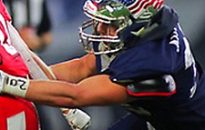Additionally, UT offers resources such as the Center for Students in Recovery, where they can meet with support counselors, like-minded support groups and social events for those pursuing recovery. This normalization of sports betting among young adults poses unaddressed risks. In the same way students are encouraged to drink responsibly, they must be equally careful […]


Additionally, UT offers resources such as the Center for Students in Recovery, where they can meet with support counselors, like-minded support groups and social events for those pursuing recovery.
This normalization of sports betting among young adults poses unaddressed risks. In the same way students are encouraged to drink responsibly, they must be equally careful about sports gambling. Through creating a culture of responsibility and awareness, we can prevent gambling addiction from taking root and help students focus on their academic and personal goals without the risk of financial strain or emotional distress.
As it turns out, gambling addiction is very similar to other types of substance abuse disorders, such as drinking or smoking, even when it may not seem to be as apparent.While gambling can be an enjoyable activity for some, students must approach it with caution and awareness. Responsible gambling practices, such as setting financial and time limits, can help mitigate risks. Betting platforms allow you to set max deposit, and betting limits have time-out features that users should use to prevent cascading into addiction.
The illusion of easy money can cause students to underestimate or ignore the addictive nature of gambling. They may enter casually, betting on a favorite team or hyped-up game, only to find themselves repeatedly drawn back, chasing losses or trying to outdo previous wins.
“Twenty years ago, when we thought of somebody who might have a gambling process addiction, we would think of … environments that weren’t particularly attractive to young people, nor were they particularly easy to access,” said Lilly Ettinger, the director of the Center for Students in Recovery. “(Now, it’s) pretty well established statistical knowledge that gambling has increased as technology has made it easier.”
Gupta is a statistics and data science freshman from Frisco, Texas.
Sports gambling has gained incredible traction in recent years, particularly among college students, and bolstered through aggressive advertising, “free bet” promos and high-profile athlete endorsements. According to the NCAA, a whopping 67% of students on college campuses admit that they bet on sports, with 6% admitting they have lost more than 0 in a single day through wagers.
The future of our generation depends not only on the choices we make in our studies or careers but also on how we handle temptations. To succeed, we must understand that gambling is not a quick route to wealth, but a risk that should be approached with caution.
“You have kids who are obsessed with sports, so they know so many details about how this player might perform, how this game might go, that they feel like they have a good shot of making a ton of money easy,” said Kaustubh Duddala, a statistics and data science freshman.
“We’re looking at increase in tolerance, and they very closely match a lot of different substance use disorder diagnostic criteria,” Ettinger said. “So, is this causing difficulty in somebody’s life across multiple different domains? Are they spending money they don’t have? Are they giving up on things that they enjoy doing to do it?”
Betting apps have never been easier to access, especially with young adults drawn to promises of quick winnings and excitement with just a couple of easy picks.














